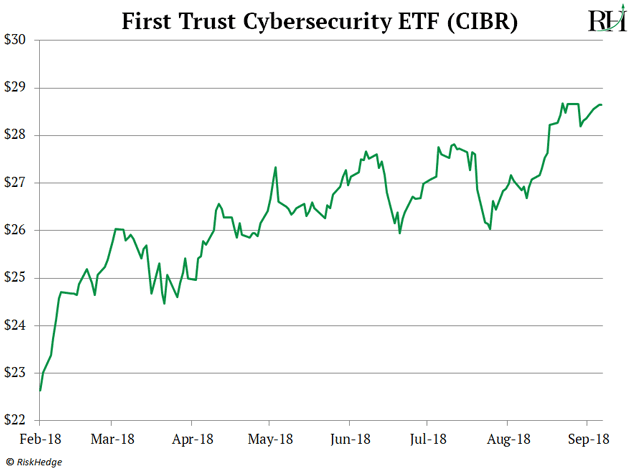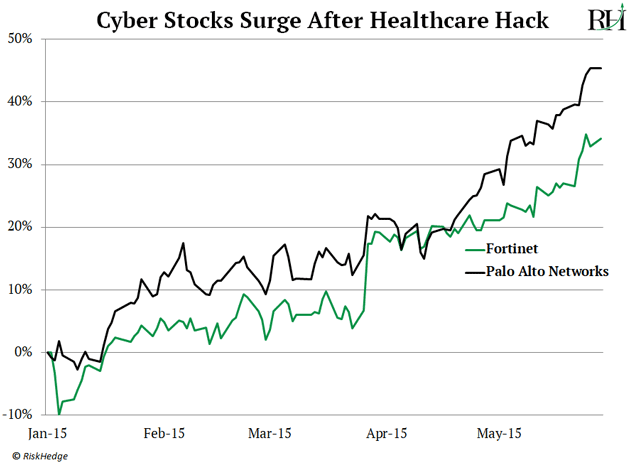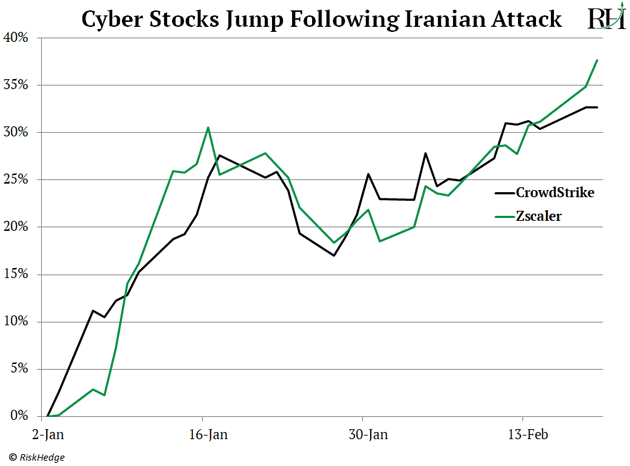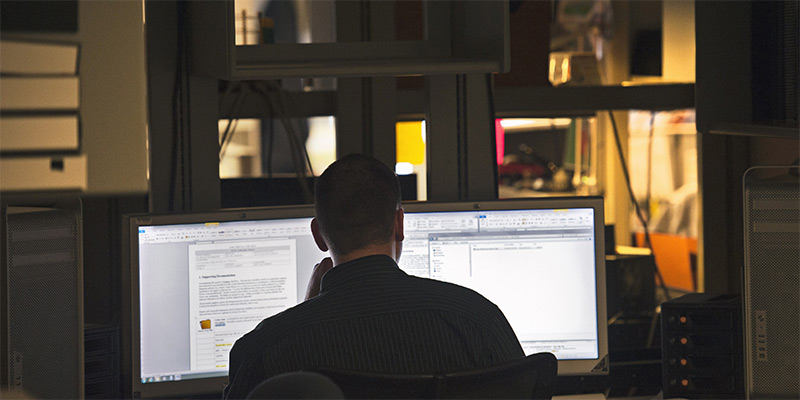This might be my most controversial call ever…
You know me as the disruption guy. It’s my job to study disruptive trends and show you how we can make money from them.
And coronavirus is one of the most disruptive forces we've ever seen...
Last week, I showed you how this pandemic just triggered a disruptive megatrend in the $1.5 trillion/year US grocery market…
Now the virus is sparking a far more sinister disruption.
It’s laying the groundwork for a massive cyberattack.
In fact, I’m on record today saying we’ll see the largest cyberattack in HISTORY within the next six months.
Nobody is talking about this today. Fighting hackers is the last thing on most folks’ minds…
But coronavirus practically guarantees “largest cyberattack ever” will soon be plastered all over the frontpages.
I’ll explain why in a second. And I’ll show you the proven pattern for making big money off cyberattacks.
But first…
- Do you know the key to defending against hackers?
Talk to any cyber expert and they’ll tell you a big chunk of time and money is spent on reducing their “attack surface.”
Let me explain…
Imagine playing a game where you have to break into two buildings.
The first is a Beverly Hills mansion. You can try to get in the front door. If that doesn’t work, you can enter through the poolside bar… any one of twenty windows… or sneak in through the basement.
The second building is an underground concrete bunker. No windows. Only one door.
It would be a lot tougher to break into the concrete bunker, right? There is only one way in. Which means the “owners” can focus all their efforts on securing that one point.
This is also how it works in cyber-land. The more devices connected to a network, the larger its attack surface grows… making it easier for hackers to infiltrate the network.
In short, each new device is a gateway where hackers can find vulnerabilities in and use it to wreak havoc on your system.
- The coronavirus just ripped open every company’s virtual defenses.
Before the pandemic hit, employees who worked remotely were usually given special work laptops with beefed up security.
For example, my friend works for the Irish tax authorities—the equivalent of the IRS. He often works from home, but under strict guidelines. He must use a dedicated work laptop and a separate, secure wi-fi connection.
He has to jump through multiple security hoops to even get past the welcome screen. For example, he must plug in a USB security stick to “unlock” work files. These measures make him difficult—but not impossible—to hack.
In short, this is the level of security needed to ward off hackers.
The thing is… coronavirus has uprooted all our lives in many ways. And among the most visible disruptions is forcing hundreds of millions of Americans to work from home.
- Every company’s “attack surface” just exploded.
Practically every employee in every firm in America is working from a makeshift desk on their kitchen table.
Firms only had days to cobble together remote work plans. So you can bet most didn’t set up secure systems, like the one my friend is using. In fact, the vast majority of employees probably don’t even have dedicated work laptops.
So hundreds of millions of folks are using personal laptops–on unsecured home internet connections–to access work files. Many of which likely contain confidential information and personal data.
This is a dream come true for cyber criminals.
Hackers only need to gain access through one entry point to seize control of a whole network. Once they’re in… they can steal data… secrets… and even lock you out of the network.
Hackers broke into the networks of America’s largest defense contractor, Lockheed Martin, by targeting remote workers. If they can infiltrate this system, you best believe remote workers with little security are easy pickings.
- It’s only a matter of time until “the largest cyberattack in history” flashes across your screen.
In the past month, hackers have targeted the US Department of Health. And attacks against the World Health Organization have more than doubled.
These are only the hacks we know about. Cyber intelligence firm CYFIRMA revealed cyberthreats related to coronavirus shot up 600% from February to March.
It’s only a matter of time before we hear about a major cyber breach.
- And that means now is a good time to bet on cyber stocks.
Look, I hope I’m dead wrong predicting that we’re about to see the biggest cyberattack in history. None of us want to see a big company or government taken down. Especially not when the world is fighting a deadly pandemic.
But remote workers are fertile ground for cyber criminals. The attack surface has never been wider, so a major cyberattack is baked in the cake.
Fortunately, there is a proven pattern for making money from cyberattacks…
- When major hacks hit the newswire, cyber stocks surge.
Do you remember when news broke about the Facebook and Cambridge Analytica scandal in early 2018? It sparked a huge run-up in cyber stocks. The largest cybersecurity ETF (CIBR) jumped 25% over the next six months:

This wasn’t the first time a major hack sent cyber companies surging. In February 2015, US health insurer Anthem revealed 80-million personal records were stolen.
Many cyber stocks jumped 30%+ over the next four months:

And we saw this same pattern again less than two months ago.
In January, the US military launched a missile attack that killed an Iranian general. Iran is a cyber superpower, and they vowed revenge by striking America’s digital networks.
Some cyber stocks jumped as much as 30% in just six weeks!

In short, investors frantically buy cyber stocks after the major cyberattacks hit the headlines. But you want to be invested before the rest of the world piles in.
With the groundwork for the largest cyberattack in history being laid out as I type, I expect this pattern to repeat soon.
Stephen McBride
Editor — Disruption Investor
P.S. This isn’t something you can afford to ignore. That’s why I just released an urgent briefing for all RiskHedge readers.
In it, I explain what’s really happening right now behind the scenes. As you’ll find out, America’s enemies are now actively plotting a “cyber 9/11”… but there’s a source of hope.
Go here to get the full story: America Under Attack.
Reader Mailbag
This pandemic has uprooted all of our lives in some way. That’s why I think it’s important to stick together as we get through this. Last week, I shared some updates from your fellow readers on how they’re getting by. Today, we hear from two more…
You can share your stories—and any questions you have for me—here: stephen@riskhedge.com. I look forward to reading them all.
Hello from New Zealand.
We are in full lockdown here, aside from essential services. I’m now working from home, as is my entire office. My partner is a police officer and is heading out to work as usual. He is based at Auckland International Airport and dealing with incoming citizens and permanent residents, as well as outgoing foreigners being repatriated to their homes. Germany just flew a plane down to collect their citizens who were stuck here as there are few flights now.
Anyone coming in (only citizens and their immediate families) is either being allowed home to self-isolation if suitable arrangements are in place or is put into quarantine in city hotels to try to prevent further infections of the resident population. Our government acted early—I think we had well under 100 cases when we were given just over two days to get to our homes, or shut-down locations, for an initial four-weeks of isolation.
We are allowed out to purchase groceries and medicine, though only one nominated person from each household is to go, and for exercise. However we are to stay in our local area and must stay two meters apart from others not part of our isolation “bubble.” Official instructions are to avoid any activity that may require us to be rescued—so no swimming, surfing, fishing, or hunting for example.
People are putting teddy bears in their front room windows so that children out for walks have a fun activity to focus on. I’m lucky to live a block away from a very large city recreational area called One Tree Hill and Cornwall Park—a total of over 270 hectares of park and farmland. At the center is a volcanic cone that provides excellent uphill workouts and fabulous views across the city and the two harbors it is built around. I’ve climbed the peak four times in two days and already lost over 1kg.
Sadly, the country lost its first victim to the virus today, an elderly person with underlying health conditions. Hospitals—the majority of which are government funded—have cancelled elective surgeries in anticipation of Covid-19 patients and are at 50% occupancy (normally around 90%) to allow for incoming cases. It seems we are well prepared and tackling the virus proactively, after an initial delay in closing our border.
With our borders closed, likely for a lengthy period of time, the tourist sector of the economy has been wiped out almost overnight. No doubt it will be partially resurrected once we are allowed out and about. Presumably we won’t be allowed to holiday abroad for some time and will have to do so in our own country. Economically, the border closure hurt many, but as we were bursting at the seams with international visitors, a quieter period to see our beautiful home will not be unpleasant.
The general mood seems to be fully in support of government actions. You may have heard of our dynamic Prime Minister—who gave birth in office and has since presided over a mass-shooting in Christchurch (really the first such shooting here), a volcanic eruption at White Island, and now Covid-19, and our first ever border closure and lockdown. Leading with strength and compassion, it is hard to see how she won’t be re-elected later this year.
As we say here in times of difficulty, in New Zealand’s second official language (the third being sign language), Kia Kaha (stay strong).
Warm regards—Margaret
Here I sit at 80 years old. A non-drinker, non-smoker with a couple of mildly serious health issues, widowed, and my nearest blood relative a 4-hour drive away by car.
I have turned off the TV and get all my information online. I have food and water for a month, and in the past 10 days, except getting my mail, I have only been out of this condo once for an Rx refill and to restock fruits and salads.
It’s an interesting place to be, Florida. With a corner on the market of elderly citizens—many infirm or with serious or very limiting health issues. Most have been retired for years. Not many have been a recent transplant like me. New to this town, not a lot of friends yet, disconnected from my favorite place of worship, it makes me feel a bit like an alien.
Know this is not a negative note. I am much more hopeful about America now than I was just three months ago. Seeing our young people make a sharp left turn in politics had me in dismay at the new year. Now I know they are learning lessons a text book could not teach. A lesson in self-reliance, in compassion, in real sacrifice, and the value of saving for that rainy day that ultimately could turn into a storm.
Life lessons. God is good. —ADL




